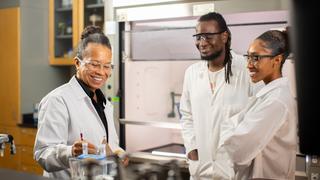A Triangle businesses organization is supporting clinical research and technology training at North Carolina Central University with paid internships at area pharmaceutical laboratories and other settings.
The Research Triangle Foundation has provided $70,000 over the past two years to allow students to work in professional laboratories through a paid six-week internship, said Tracie Locklear, Ph.D., leader of the Clinical Research Program at NCCU’s Biomanufacturing Research Institute and Technology Enterprise (BRITE).
“Students get hands-on experience working in clinical research, so they get to apply what they have learned,” Locklear said. “And it’s experience they can put on their resume.”
The university offers a clinical research certificate, as well as a bachelor’s degree and a minor in the field. Clinical research scientists help ensure the safety and effectiveness of new medicines, health devices, diagnostic products and more in a variety of ways, including clinical trials involving human participants.
Laura Perez, a senior public health education major, said she enrolled in the certificate program to round out her knowledge of scientific research.
“I feel 100% fortunate not only to have been able to complete the certificate but also to have the opportunity to do the internship,” said Perez, of Durham, who interned with IQVIA in summer 2021. “It gave me more insight in what I can do in my career and sharpened both my soft and technical skills. It was a valuable learning experience from day one.”
The Clinical Research Sciences Program, part of the Department of Pharmaceutical Sciences, was established in the fall of 2018 in partnership with Duke University and funding from the National Institutes of Health. The Research Triangle Foundation is a nonprofit supported by companies and industries with a presence in the region.
Karen LeVert, a venture partner with Pappas Capital, said the real-world experience, exposure and connections made through internships help clear the pathway to establishing a career.
“I’ve seen a lot of students end up in fulltime positions because of internships,” said LeVert, a member of the BRITE Advisory Board. “It gives the student exposure to the company and the company exposure to NCCU students. It’s super important for them to get that experience.”
Goals for the Clinical Research Sciences Program include assisting with workforce development and community-based engagement to address issues such as equity in health research. Instruction is provided by research professionals and academic specialists, most with industry experience.
Courses are offered online, hybrid and face-to-face settings leading to a Bachelor of Science in Clinical Research, as well as a clinical research minor and the clinical research certificate.
Triangle Foundation Invests in Internships for Aspiring Research Scientists

You May Also Like

The Office of HBCU Outreach at NCDOT has awarded six students a HBCU/MSI Transportation Scholarship for $2,500. An additional student received a $700 scholarship.

The partnership provides NCCU students interested in a doctoral degree in pharmacy an opportunity to pursue an early assurance of admission to the school.

NCCU will honor Black History Month with a lineup of events throughout February 2025, spotlighting pivotal moments in African American history.